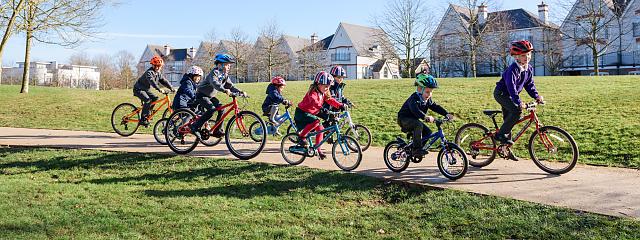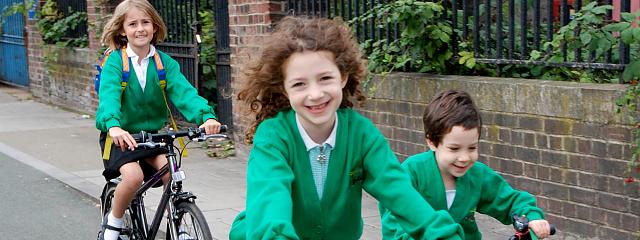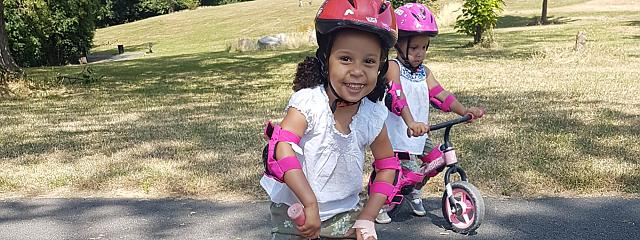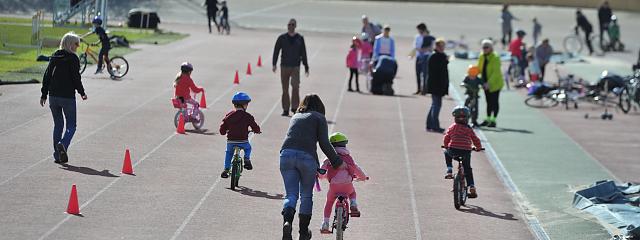
Should children cycle on the pavement?
Should children cycle on the pavement?
I am the mother of a four-year-old who regularly cycles on the pavement, so I must confess I was really shocked when I read the report in Grantham Journal, that four-year-old Sophie Lindley was stopped by Lincolnshire Police as she was cycling to school on the pavement.
Sophie's father Dale, who was with her at the time, told the newspaper: “A police car pulled over and told me she had to get off her bike as it is against the law to ride on the footpath. He then drove off but said he’d be checking his mirrors, and if he saw her riding the bike again he would confiscate it.” Sophie was understandably upset and her father then had to carry his daughter and her bicycle to school.
As only 1% of primary children in the UK cycle to school, it seems obvious to me that cycling to school on the pavement for younger children should be encouraged and this kind of behaviour from the police is unacceptable. Most four-year-olds are still learning to cycle, so are still practising steering and braking safely. Therefore, they need to be well away from traffic.
It is easy to walk alongside a four-year-old who is cycling and encourage and teach them about negotiating everyday hazards. If you are helping a younger child to cycle, pavement cycling teaches them skills they cannot learn just zooming about in the park.
Obviously, as a parent it is your responsibility to make sure a young child cycling on the pavement is doing so safely and not putting vulnerable pedestrians in any danger. Just as you would if your child was riding a scooter.
My son uses his bike most days, and the vast majority of people on the pavement are very encouraging and we've not had any problems at all. However, I am aware that technically what we are doing is against the law.
My son uses his bike most days and the vast majority of people on the pavement are very encouraging and we've not had any problems at all. However, I am aware that technically what we are doing is against the law.
Victoria Hazael, Cycling UK's Senior Communications Officer
So what does the law say about cycling on the pavement?
Section 72 of the Highways Act 1835 made it a criminal offence to “lead or drive” a “carriage of any description” on “any footpath or causeway by the side of any road made or set apart for the use or accommodation of foot passengers”. In 1888, s85(1) of the Local Government Act declared that “bicycles, tricycles, velocipedes, and other similar machines are ‘carriages’ within the meaning of the Highway Acts”. The maximum court fine is £500 or the police can issue a £50 fixed penalty notice (FPN). In short, it is illegal to cycle on a pavement alongside a road, unless it has been marked as a cycle track.
However, children under the age of 10 are below the age of criminal responsibility. Therefore, they cannot be prosecuted for a criminal offence. They cannot be issued with a fixed penalty notice either as they cannot be given to anyone under the age of 16.
This means that, whilst police officers can theoretically stop young children (aged under 10) who are cycling on pavements, they have no powers to arrest, fine or even caution them. This is sensible, as young children should not be expected to cycle on the road. To prepare them for this step as they get older, Cycling UK thoroughly recommends high quality cycle training.
In any case, there are no powers for the police to confiscate pedal cycles being ridden on the pavement, not for cyclists of any age.
In my opinion, Sophie deserves an apology from the police officer. When I spoke to Lincolnshire Police about the matter today, they sent me this statement: “Safety is our priority and cycling on the pavement is illegal. However, common sense obviously prevails and in the case of young children officers would use their discretion and offer the most appropriate advice for the circumstances.”
For more information about what is legal and illegal when cycling, see Cycling UK's campaigns briefing on Cyclists' behaviour and the law.
What about adults who cycle on pavements?
For those aged 10 and over, the law is clear: it's illegal, except where there is a marked cycle track. Moreover Cycling UK believes that all road users have a duty to respect the rules of the road and one another's safety. We are not in the business of defending irresponsible cycling, any more than you'd expect the AA or RAC to defend irresponsible driving.
However in practice, cyclists are often faced with the difficult choice of either acting legally or keeping safe. Unclearly signed shared-use paths and the lack of thought for cyclists by many planners and designers of the road network, have left many cyclists confused and those who lack confidence or who are frightened of busy roads then choose to cycle illegally on the pavement.
Cycling UK is calling for the creation of Space for Cycling, so that people of any age or ability can make any local journey, safely, conveniently and enjoyably. Then cyclists would no longer have to chose between what is legal and what is safe. Unfortunately, this won't happen quickly.
So, in the meantime, it is surely right for police officers to exercise discretion - particularly when the resources for roads policing are as stretched as they are at present. It makes no sense for the police to be fining cautious cyclists for minor infringements if they are causing no danger or intimidation to anyone, when they lack the resources to enforce 20mph limits or prosecute drivers who kill.
Is there a defence if you are given a Fixed Penalty Notice?
When Fixed Penalty Notices (FPNs) were first introduced in England and Wales, Cycling UK and other cycling organisations asked for assurance from the Government that the penalty would be applied fairly and only used when the behaviour put pedestrians at risk.
In a written response (see below), the then Home Office Minster, Paul Boateng MP, said that the introduction of the fixed penalty: “…is not aimed at responsible cyclists who sometimes feel obliged to use the pavement out of fear of the traffic, and who show consideration to other pavement users when doing so. This is not a clamp down on responsible cycling, and I know the police service too do not see it in that way.” (Paul Boateng MP (Home Office) to Ben Bradshaw MP, 9/7/1999).
In 2014, this advice and a reminder that police should use their discretion over fining people for cycling on the pavement was re-circulated to police forces, and endorsed by the Department for Transport's cycling minister, Robert Goodwill MP. It has also been included in the guidance to officers and PCSOs taking part in the Metropolitan Police's Operation Safeway. This is a clampdown on both driving and cycling offences which was first launched after a horrific spate of six London cycling deaths in 13 days in November 2013. The inclusion of this guidance is a small victory for Cycling UK trustee Kristian Gregory, who - thanks to support from the Cyclists' Defence Fund - mounted a successful challenge to a Fixed Penalty Notice he received during Operation Safeway for straying marginally over a white line on a substandard and poorly-signed pavement cycle track.
CDF provides information about Fixed Penalty Notices and how best to respond to them.
Cycle training for older children and adults instead of fines
Cycling UK believes that police officers should have the option to send cyclists of any age found riding on the pavement on a cycle training course, if they are not posing a danger to others or riding in an obviously antisocial manner. This would help them feel more confident about riding on the road.
My only hope is that what happened to Sophie Lindley last week won't put her off cycling to school and that her bad experience isn't repeated anywhere in the UK. We need to be doing all we can to encourage children to get in the habit of cycling.
In my opinion, police need to be more supportive of young children cycling on the pavement, the law needs to be clearer, parents need to be reassured it is ok, and there needs to be more investment in safer routes to school and cycle training. Only then could we see levels of cycling to school reach anywhere near the levels in Denmark and Holland.













Comments
I didn't realise it was
I didn't realise it was illegal for young children to ride on the pavement. I thought there was some restriction based on the maximum size of wheel allowed. It would be ridiculous and dangerous to force young children to ride on the road.
It does seem even more daft when mobility scooters are allowed on the pavement, but young children aren't allowed on their bikes. Don't mobility scooters count as 'carriages'?
In our town (Cheltenham) most of the designated 'cycleways' are not dedicated cycleways at all, but dual-use pavements (with blue signs depicting pedestrians and bicycles to show they are dual use). Not all of these are really wide enough to have pedestrian and cycle lanes and in places cycleways even go through bus-shelters!
Some of these dual-use paths are fine, not that pedestrians take any notice of the bicycles where these are painted on one side of the path where there are separate lanes . I don't mind them walking on the wrong side of the path, but I do object to them wandering from side to side, or allowing their dog-leads to stretch right across the path, completely oblivious to any cyclists approaching from either direction!
However, my point is that, if dual-use pedestrian and cycleways are acceptable, it makes no sense to exclude young children from pavements.
The idea that there's an
The idea that there's an exemption for small-wheeled pedal-cycles is a myth - a widely-believed myth, but a total myth nonetheless.
What protects young children (and their parents) against any kind of sanction for riding on pavements is the wider legal principle that children aged under-10 are below the age of criminal responsibility. In other words, there is a general legal presumption that under-10s cannot commit crimes full stop.
By contrast, there are explicit exemptions allowing mobility scooters to be driven on footways and pedestrianised areas - but subject to a 4mph speed limit. See www.gov.uk/mobility-scooters-and-powered-wheelchairs-rules/overview.
Roger, being picky, wouldn't
Roger, being picky, wouldn't it be more accurate to say "children under the age of ten cannot be held responsible for crimes they might have committed"?
In other words, a child cycling on the footway of a public highway is most certainly committing a criminal offence, against the Highway Act 1835. The key point is that they themselves cannot be held responsible for that crime.
This is important because someone else, perhaps the parent, could still possibly be punished for allowing the crime to take place.
I have always known that
I have always known that cycling on the pavement is illegal and have never knowingly permitted any of my children to do so. I trained them off road initially and then introduced them to road use gradually. I would not disapprove of parents who do allow their children to do so as I'd prefer them to learn to ride than not. I am not so happy about parents who don't teach their children to stop, dismount and give way to pedestrians coming the other way on a narrow footway especially if the bicycle is fitted with trainer wheels or indeed if it is a tricycle. Training should start from the moment children mount the saddle and rule 1 of highway use is acknowledging and considering other users. It is in that spirit that the law exists although the law cannot and should not be applied to children of that age.
This is a clear example of a
This is a clear example of a legislation totally oblivious to cyclists. Everyone agrees that a child aged 10 or less should be allowed to cycle on the pavement as long as they do not pose a danger to other pavement users. The laws should be amended as to permit this. In cycle-friendly Germany it is in fact illegal for a parent to put a child under 8 on a road that has motor traffic. Sensible.
The legal situation is
The legal situation is basically a historical accident.
Carriages were banned from using the footway in 1835, before cars or bicycles had even been invented. Later, when cycling started to become common, it made a lot of legal sense to simply say that a bicycle is a carriage (they travelled at similar speeds, had similar wheels, etc.) and thus should remain on the carriageway. It all made perfect sense when the law was written.
The problem occurs simply because the law was never revised to take into account the arrival of the motor vehicle, which now routinely creates fear and danger for cyclists still riding on the carriageway.
Personally I don't think cycles belong on the "carriageway" any more, and they still don't belong on the "footway". We need to add "cycleways", just as the Dutch and Danes have (and now London too!). Then everyone is happy!
Easy to be wise after the
Easy to be wise after the event, I was waiting at the traffic lights some time ago and a police officer made the comment I had bald tyres, I marched him over the other side of the road to the police station to see his chief inspector I had two day old continental gator skin tyres and the manufacturers mould mark eas still visible.
At the station they looked at the bike closely, my final comment I am an engineer and I maintain my bikes and as hard as you looked you could not find fault, and may I ask you to obey rule 163 and not park on the pavement, there was no apology just an immature look!
As I walked out I heard a few raised voices
I urge the father to complain the A1 Scotland yard, waste of time locally - cover up
Do you mean to tell me the force cannot locate the officer, what does that tell you, how is your confidence in the police after reading this comment
Presumably, the Police
Presumably, the Police Officer then moved on to take action against the drivers of dozens of motor vehicles that had been driven onto the pavement before they were parked to offload their less energetic school attenders?
Imagine the reaction if that had happened!
Let's have a consistent approach.
Pete
I think the solution is easy,
I think the solution is easy, amend the Highways Act to fit today's reality, some roads are just far too dangerous to cycle on, this legislation is ridiculous , 1835 was the same year we banned bear baiting and cock fighting! The same year Charles Darwin landed on the Galapagos Islands, from which he developed the theory of evolution!
It's high time this anomaly
It's high time this anomaly was sorted out. The situation is presently very confusing. Many pavements are now designated "shared" - cyclists and pedestrians. Some cycleways and footways are not marked as such, so genuine mistakes are made. Cyleways & footways are sometimes blocked with parked cars or other hazards..
I have spoken with my local Police about this problem. Their view is they would not take any action on under 16's PROVIDED they do not abuse the dispensation and cause nuisance or danger to other people. It is clearly totally unreasonable and downright dangerous to expect under 10's to cycle on the road.
Fortunately common sense seems to prevail in my area. Maybe Lincolnshire Police should take notice?
Martin
(British Cycling commissaire)
One road in particular near
One road in particular near to my home sees cars and larger vehicles travelling at 60 mph (or more) with little margin for error. There is certainly no room to pass a cyclist safely if there is traffic coming the other way and, of course, the motorists don't expect to wait, but try to blast past within centimetres of a cyclist.
There is a pavement along one side of the road. On the rare occasions I use this road I travel for about a mile along it and rarely encounter a pedestrian. I therefore use my common sense and ride on the pavement where I cause no problem to the motorists and where I am much safer.
If I am fine for riding on the pavement, so be it ..... I would rather pay £50 than end up dead.
Andy
In general, ignorance of the
In general, ignorance of the law is no excuse. Lack of criminal resposibility excludes a child from this generality, but the parents should know better. Also, if a pavement is unsafe for competent adults, it is much less safe for inexperienced children. There is very little that the parents could actually do to prevent a collision with pedestrians. Many of the comments have focussed on the safety of the child whilst ignoring the safety of pedestrians, for whom the pavements are intended. Children should be taught to ride safely in an environment that is safe for everyone.
Another consideration is that children who cycle on the pavement might well continue this behaviour as they get older. As for demanding an apology from the police - shame on the parents for setting such a high handed example.
In my area PCSO's go into
In my area PCSO's go into schools, explain the law and the reasoning behind allowing exceptions for very young children, emphasising that riding must be considerate and not antisocial or dangerous.
The small wheeled low geared bikes used by under 10's are not capable of great speed.
I hope you are not suggesting that under 10's should ride on the road!
Martin.
I agree with other commenters
I agree with other commenters that it is strange that we allow mobility scooters onto pavements, and allow cycles and mobility scooters onto dual-use pavements, yet bar very young children indeed from using their little bicycles on pavements, though they take up less space. Young children are kept off the road for safety reasons, but there is ultimately no good reason for restricting capable young children from moving about on foot, or by scooter, or bicycle, as this exercise is good for their health and development. Children's needs must be taken into consideration. The world isn't only for adults.
Victoria Hazael might just as
Victoria Hazael might just as well have begun by saying: "I am a responsible adult who regularly commits a certain traffic offence for my own convenience. One of the things that lowers the reputation of CTC members with the public is the constant array of those who bleat away trying to justify committing offences. There is no difficult choice between keeping to the law and staying safe. You keep to the law and if you don't feel safe riding on the carriageway or other authorised route then walk.
Neither do I see any reason for confusion. We would do better if people used the right language. Forget the word "pavement" as its proper meaning is just a paved surface. The rules are simple:
1. It is illegal to cycle on a footway.
2. It is not illegal to cycle on a footpath unless there is an Order in force and the appropriate signs are displayed.
3. If a former footway has been divided in two and one half is indicated as a cycle route then is it permissible to cycle on that part but not on the other part that remains a footway.
4. If a former footway has been designated as a "shared surface" it is permissible to cycle anywhere on it but pedestrians have priority.
5. It is not illegal to walk on a cycle track but cyclists have priority. In extreme circumstances harassment by walkers might possibly be viewed as a potential breach of the peace!
Does "Fonant" know just how serious is his or her suggestion that "cycles don't belong on the carriageway"? This right is what the CTC has fought for for generations and is not to be surrendered. A cycle is a carriage; it belongs on the carriageway and other road users must be educated to act accordingly or penalised if they do not.
Finally, it is most disappointing that the CTC, like so many other websites, permits posting other than under real names. In my view this practice is little short of cowardly skulking.
I can see the ambiguity, but
I can see the ambiguity, but I think her first sentence is saying it's the 4-year-old who regularly cycles on the pavement, not the mum.
Interesting story. Here in
Interesting story. Here in Canada, in most cities, there is a definition involving wheel size - so if your wheel is less than, I think, 24 inches or less, you are allowed to ride on the pavement/sidewalk. The idea is that the only bikes with such wheels are children. Of course, it does open up a loophole for people riding folding bikes with small wheels. In fact I ride on the sidewalk for a very short distance in the final bits of my commute to the train station, as those final bits involve a busy dangerous intersection. I am ready to jump off my bike if the law is around, and there are virtually no pedestrians ever there.
Bill, Oakville, Ontario, Canada
Unless there are
Unless there are circumstances not reported the officer has been very silly indeed (it is being reported as a police officer but of course it may have been a PCSO). Hopefully, the embarrassment for the police caused by the incident will make this officer (and others) much wiser going forward.
best electric scooter for adults foldable
Thanks for sharing this post. I am very interested in topic. I would like to share my opinion on topic. best electric scooter for adults foldable Each mobility scooters could be personalized to suit a specific want of a purchaser. Lots of these things often price further, identical to upgrading to leather-based seats if you purchase a brand new automotive.
In my area PCSO's go into
In my area PCSO's go into schools, explain the law and the reasoning behind allowing exceptions for very young children, emphasising that riding must be considerate and not antisocial or dangerous. The small weed seeds low geared bikes used by under 10's are not capable of great speed. I hope you are not suggesting that under 10's should ride on the road!
re
Thanks for sharing this post. The post is well written and all the details are clear.
I want to add a point here :
Kids are advanced these days and gone are the days when parents used to come with their childeren for commuting from one place to another .
In this era, electric bike for kids are becoming popular among kids , they love to travel on these e-bikes on their own and parents no need to worry anymore.
I hope , i have made a valid point . Do let me know in the comments.
Cyclist Issues
I think it's stupid that this is not allowed.. Cyclists should be free to ride on the pavement as or on the street as preference. The issue i have with biking on the street is you cant possibly abide by the speed limits that are set by law. Which means you will be cycling at a much lower speed which is a hazard to other vehicles. Biker's should not be allowed to bike on the street and should only be allowed on the paved sidewalk because they bike slower than actual vehicles on the road. If bikers want to be considered vehicles than go the speed limit.. oh wait, you can't... so stay on the sidewalk! Just my 2 cents.
Daniel R. - windowcleaningwinnipeg.com
I have a 9 year old with
I have a 9 year old with learning difficulties (registered disabled) and we are trying to give him confidence to cycle so we cycle round the estate with him on the pavement.
Unfortunately he hit the back of a car which was parked on a driveway but sticking out onto the pavement and possibly scratched the paint. The part that is scratched was the part which was sticking onto the pavement. Does anyone know the position of this? Has the car owner contributed to the incident by having his car protrude onto the pavement? The pavement was easily wide enough for the child to miss the car. Are we liable for the damage the child might have caused (we struggle to see he could have caused it as the damage is above handlebar height)?
Many thanks
Contact the Cycling UK incident line
Hi Nick, we'd advise you to contact the Cycling UK incident line and they will help you. https://www.slatergordon.co.uk/unions-federations-and-charities/cycling-uk/
Indeed, it's a complicated
Indeed, it's a complicated situation. From the Police Officer's point of view, he was done the right think to pass the information about the law to the father of that kid. And when I see the version of your thoughts about the issue, it's acceptable that the kids should be encouraged in a positive manner. Problem here is neither with the policeman nor with the kid, but with the laws. The law should have some changes to allow kids cycling on the pavement when they are with their parents, at least.
I'm living in Dubai and working here in a maid service agency known as Housekeeping Co as a professional trainer. Once you are in the streets, it's cycling everywhere in the footpath in Dubai; it's not only kids but everyone from the society from workers to college going students. The paradox is that cycling on the pavement is forbidden in Dubai as well, but no one cares.
Regards,
Anna Mike